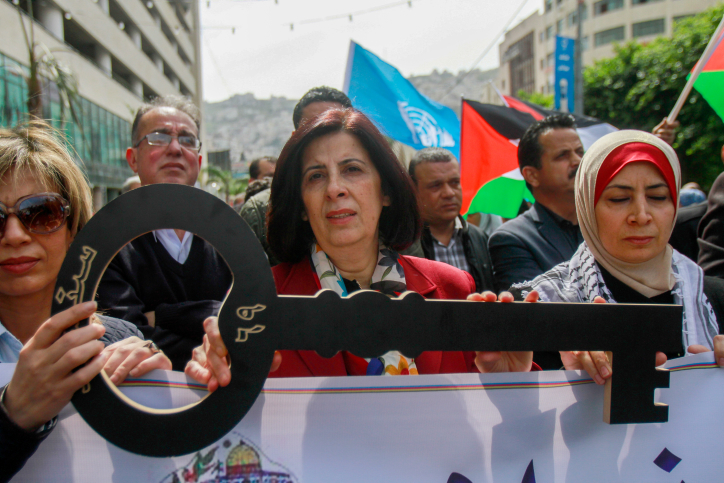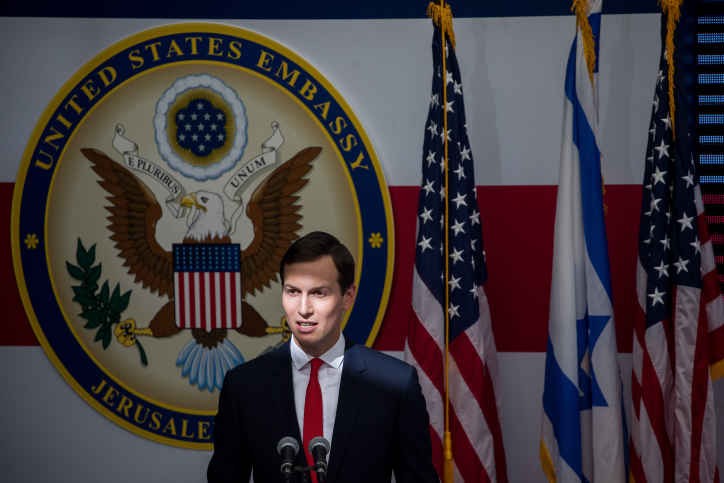By defunding UNRWA and attempting to define Palestinian refugees out of existence, the Trump administration is only shooting the messenger. UNRWA is a product, not the source, of the Palestinian refugee problem.
By Zena Agha

Last Friday, the Trump administration announced that the United States would no longer fund the United Nations Relief and Works Agency (UNRWA) – the U.N. body which delivers vital aid to some 5.3 million Palestinian refugees across the Arab world. The cut, which amounts to $300 million, constitutes about 30 percent of the organization’s total yearly budget.
Describing UNRWA as an “irredeemably flawed operation”, the Trump administration has yet again belied its animosity against the refugee agency, whose mission is to provide relief for Palestinians expelled from their homes during the Nakba in 1947-8. Jared Kushner, Trump’s son-in-law and special advisor on the Middle East, wrote in a leaked email to his father-in-law: “Sometimes you have to strategically risk breaking things in order to get there.” Listening to Kushner and others, one would be forgiven in thinking that Palestinians relish being dependent on aid, as though the 53 percent of Gaza’s population living under a decade-long siege prefer to exist below the poverty line. It is a vengeful act.
As with any big organization, UNRWA is not without criticism, and the relationship between UNRWA and the Palestinians has proven to be an uneasy but necessary one. In the 69 years since its inception, UNRWA has all but become a welfare government-in-exile, particularly in the years prior to the Palestine Liberation Organization’s (PLO) assumption of leadership in the mid-1960s. But today it operates as a robust, versatile, and diverse body which provides much needed food, healthcare, education, and other services to a vulnerable population scattered across the Gaza Strip, the West Bank, Syria, Jordan and Lebanon.
In an Orwellian twist, the United States gives an unfettered, unearmarked $3.3 billion annual contribution to Israel – the world’s eighth most powerful nation – on the one hand, while it works to dismantle the organization which sustains millions of people that Israel made destitute, on the other.

As far as the U.S. and Israel are concerned, UNRWA’s crime is to perpetuate the refugee question and validate the Palestinian right to return by granting refugee status to the descendants of those who were expelled during the Nakba (not an uncommon practice for refugees from protracted conflicts, such as in Afghanistan, Sudan and Somalia). The administration has devised a clumsy and reckless “solution” to this: strip the descendants of displaced Palestinians of their refugee status, allow UNRWA to only serve the estimated 20-30,000 surviving refugees (a number that will diminish each year) while discontinuing operations for descendants, redirect funds to the host country for “resettlement,” and extinguish all possibility of return for Palestinian refugees.
And the wheels for this dramatic plan have already been set in motion. In July, Congressman Doug Lamborn, a Colorado Republican, introduced bill HR 6451 which states that only surviving refugees qualify for resettlement and UNRWA services. The rest of the aid would be redirected to the U.S. Agency for International Development (USAID). The bill has been referred to the House Committee on Foreign Affairs.
In a statement, Lamborn accused the descendants of refugees of making a “mockery of both those who are true refugees around the world and those who are truly living in deplorable conditions throughout the region.” It is as incredulous as it is tragic that one misinformed politician from Colorado can declare what constitutes a “true refugee,” and manipulate the democratic process to determine the fate of millions of people on the other side of the planet.
At its core, Trump and his ilk fundamentally misdiagnose UNRWA as the source, rather than the product of the refugee reality, which will remain even if UNRWA is dismantled. Rebranding Palestinian refugees does not stop them from being refugees, a status enshrined in international law. This latest assault is intended to bully the Palestinians into capitulating in time for the unveiling of the so-called “Deal of the Century,” President Trump’s plan to end the Israel-Palestine conflict. Not only does such a move aim to take the Palestinian refugee question off the table, it is an attempt to dash Palestinian claims to repatriation and reparations as enshrined in UN Resolution 194.
What Washington fails to grasp is the root of the Palestinian grievance. Trump, Kushner, Lamborn et al. can continue to meddle with the semantics of refugee status and try to bleed resources from the institutions that sustain refugees. But the Palestinians’ demands remain clear and unshakable: the right to return to the lands from which they were forcibly expelled, and to which they are forbidden from returning – a right that predates UNRWA. Trump is simply shooting the messenger.
Zena Agha is the the U.S. Policy Fellow at Al-Shabaka: The Palestinian Policy Network. Follow her at @Zena_Agha. This article follows Zena’s policy memo published in Al-Shabaka, read it here.
